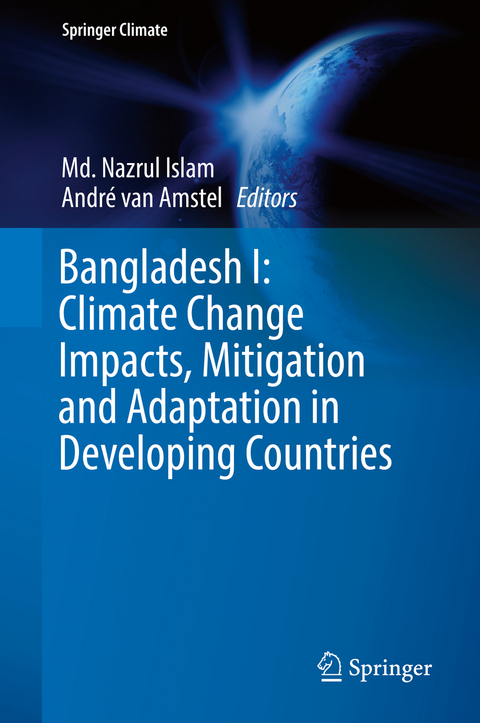
Bangladesh I: Climate Change Impacts, Mitigation and Adaptation in Developing Countries
Springer International Publishing (Verlag)
978-3-319-26355-7 (ISBN)
Dr. Md. Nazrul Islam is an Associate Professor of the Department of Geography and Environment in Jahangirnagar University, Dhaka-1342, Bangladesh. His fields of interest are environmental and ecological modeling of climate change impact on aquatic ecosystem, phytoplankton transition, harmful algae and environmental management of marine ecosystems regarding to deal with hydrodynamic ecosystems coupled model on coastal sea, bay and estuaries, application of computer based programming for numerical simulation modeling etc. He did his Ph.D. (Ecological Modeling) at Graduate School of Engineering from the University of Tokyo, Japan entitled “Numerical Simulation Modeling on the Transition of Dominant Algae and Toxin Production Mechanism Harmful Algae in Aquatic Ecosystems.” Besides, he has completed two years standard JSPS Postdoctoral Research Fellow on Marine Ecosystems and Engineering from the University of Tokyo, Japan with a novel and interesting research on ‘Numerical simulation of the effects of radioactive pollutants from Fukushima nuclear accident on marine ecosystem by integrating MEC and ECOPATH model at Kamaishi Bay, Pacific Coast in Japan’. Dr. Nazrul also visited as faculty member and invited speakers in several foreign Universities of USA, Australia, UK, Canada, China, South Korea, Germany, France, the Netherlands, Taiwan and Vietnam etc. Dr. Islam has been awarded “Best Young Researcher Award 2012” by the International Society of Ecological Modeling (ISEM) for the outstanding contribution to the Ecological Modeling fields and he has also been awarded “Best Paper Presenter Award” entitled ‘Cyanobacteria Bloom and Toxicity of Lake Kasumigaura in Japan’ by SautaiN in Kyoto, Japan. He has made more than 40 scholarly presentations in more than 25 countries around the world, authored more than 50 peer-reviewed articles and authors of 15 books and research volumes. Currently he is going to publish (jointly with Late Prof. Sven Erik Jorgensen) by the CRC press (Taylor & Francis) approved book “Environmental Management of Marine Ecosystems”. Dr. Islam is presently honored as an “Executive Editor-in-Chief” of the journal “Modeling Earth Systems and Environment”, Springer International Publications (Journal no. 40808).
Chapter 1. Climate change impact Measures from global to regional scale: Bangladesh (Md Nazrul Islam).- Chapter 2. Climate of Bangladesh: temperature and rainfall changes, and impact on agriculture and groundwater - A GIS based analysis (Md Rejaur Rahman).- Chapter 3. Vulnerability of aquaculture-based fish production system to the impacts of climate change: insights from inland waters of Bangladesh (Md Sirajul Islam).- Chapter 4. Environmental migrants in Bangladesh: a case study on climatic change hazards in the southwest coastal area (Md Moniruzzaman).- Chapter 5. Risks and adaptation strategies to climate change: a community based assessment study in the Chittagong Hill Tracts of Bangladesh (Salma Mamtaz).- Chapter 6. Climate change impacts on the coastal zones of Bangladesh: perspective on tropical cyclones, sea level rise and social vulnerability (Edris Alam).- Chapter 7. Climate variability impacts on agricultural landuse dynamics in Madhupur Tract in Bangladesh (Towfiqul IslamKhan).- Chapter 8. Detection of climate change impact on Hakaluki Haor (wetland) in Bangladesh by using remote sensing and GiS (Muhammad Rezaul Rakib).
| Erscheinungsdatum | 05.01.2016 |
|---|---|
| Reihe/Serie | Springer Climate |
| Zusatzinfo | VI, 221 p. 80 illus., 42 illus. in color. |
| Verlagsort | Cham |
| Sprache | englisch |
| Maße | 155 x 235 mm |
| Themenwelt | Naturwissenschaften ► Biologie ► Ökologie / Naturschutz |
| Naturwissenschaften ► Geowissenschaften ► Meteorologie / Klimatologie | |
| Schlagworte | climate change • climate change adaptation • Climate Change/Climate Change Impacts • Climate Change Hazards • Climate change impacts • Climate Change in Bangladesh • Climate Change in Developing Countries • Climate Change Management • Climate Change Management and Policy • Earth and Environmental Science • Wetlands in Bangladesh |
| ISBN-10 | 3-319-26355-2 / 3319263552 |
| ISBN-13 | 978-3-319-26355-7 / 9783319263557 |
| Zustand | Neuware |
| Haben Sie eine Frage zum Produkt? |
aus dem Bereich


